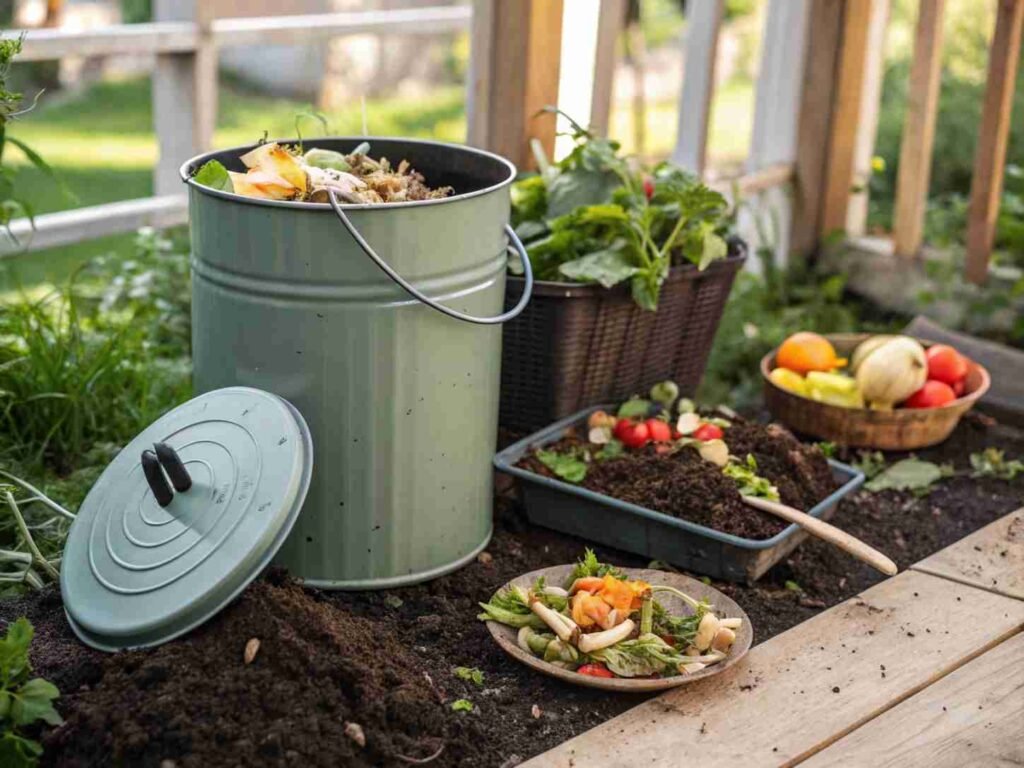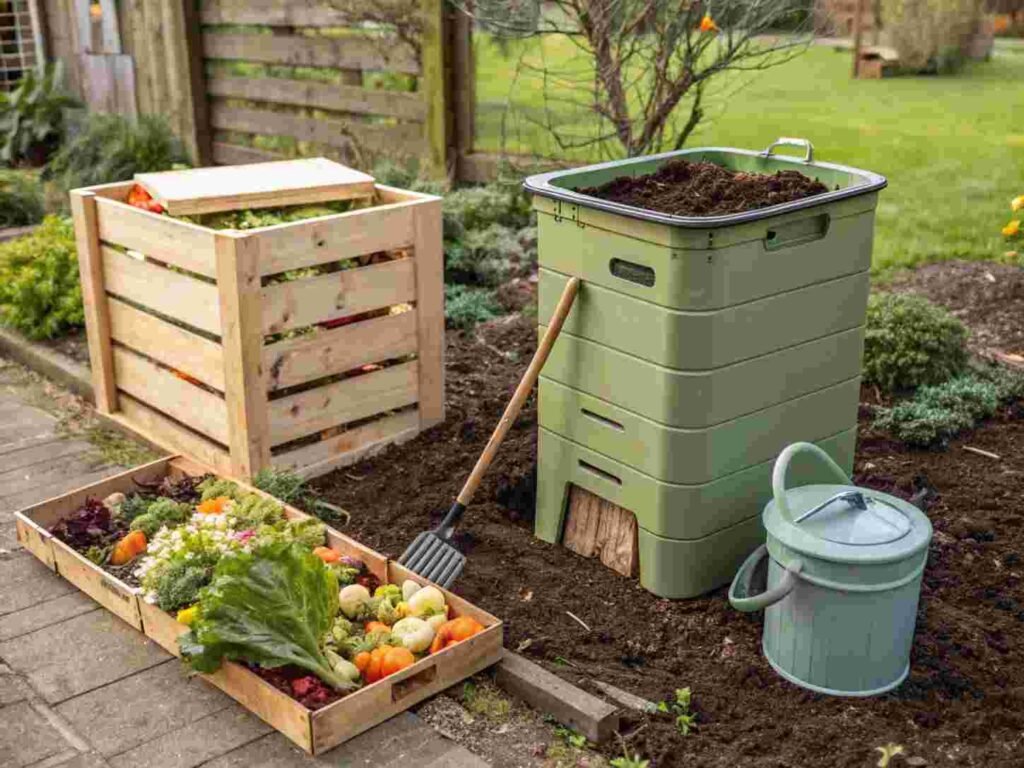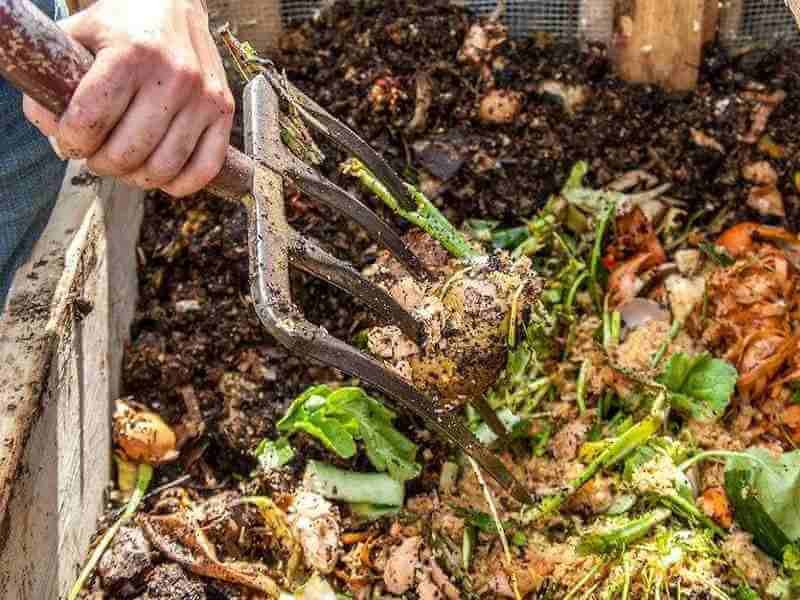In today’s world, where environmental issues are becoming increasingly urgent, composting at home has emerged as a simple yet powerful way to contribute to sustainability. Composting not only reduces the amount of waste sent to landfills but also enriches your garden soil, helping plants grow healthier and stronger. Whether you have a spacious backyard or a small balcony, composting can be adapted to fit your lifestyle and space.
This article will guide you step-by-step on how to start composting at home, what materials to use, how to maintain your compost, and how to use the finished product effectively. By the end, you’ll be equipped with all the knowledge you need to turn your kitchen scraps and yard waste into black gold for your plants.
What is Composting?
Composting is the natural process of recycling organic matter, such as food scraps and yard waste, into a rich soil amendment known as compost. This process mimics nature’s way of breaking down dead plants and animals into nutrients that nourish new life.
At its core, composting involves microorganisms like bacteria and fungi breaking down organic material in the presence of oxygen. The result is a dark, crumbly, earthy-smelling substance that can be used to improve soil health, retain moisture, and reduce the need for chemical fertilizers.
Why Compost at Home?
1. Reduce Waste
Food scraps and yard waste make up a significant portion of household garbage. Composting diverts these materials from landfills, reducing methane emissions—a potent greenhouse gas produced when organic waste decomposes anaerobically in landfills.
2. Enrich Soil Naturally
Compost improves soil structure, increases nutrient content, and enhances moisture retention. This means healthier plants and less need for chemical fertilizers, which can harm the environment.
3. Save Money
By making your own compost, you reduce the need to buy commercial fertilizers and soil conditioners. It’s a cost-effective way to maintain a thriving garden.
4. Promote Environmental Sustainability
Composting closes the nutrient loop, returning valuable organic matter to the earth and supporting biodiversity in your garden.
 compost at home
compost at home
Home composting methods
Compost Pile: Ideal for those with a backyard. Simply designate a spot to pile your compost materials.
Compost Bin: A contained system that keeps compost tidy and can speed up decomposition.
Tumbler: A rotating bin that makes turning compost easy, speeding up the process.
Vermicomposting: Using worms to break down kitchen scraps, perfect for small spaces or indoors.
Bokashi: A fermentation method that can handle meat and dairy, suitable for apartment dwellers.
how to compost at home
Materials for Home Composting
Green and Brown Materials
- Green materials: Rich in nitrogen, these include fruit and vegetable scraps, coffee grounds, fresh grass clippings, and green leaves.
- Brown materials: Rich in carbon, these include dry leaves, straw, shredded paper, cardboard, and small branches.
| Green Materials (Nitrogen-rich) | Brown Materials (Carbon-rich) |
|---|---|
| Fruit and vegetable scraps | Dry leaves |
| Coffee grounds and tea leaves | Straw or hay |
| Fresh grass clippings | Shredded newspaper or cardboard |
| Eggshells (crushed) | Sawdust (untreated wood) |
Avoid These Materials
Meat, fish, dairy, or oily foods (attract pests and cause odors)
Diseased plants or weeds with seeds
Pet waste (can contain harmful pathogens)
Treated wood or synthetic materials

Tools needed for home composting:
Compost shovel:
A wide, shallow shovel (25-30 cm wide and 10 cm deep), such as a "compost shovel," is recommended; it's 30% more efficient than a household shovel.
Material:
Galvanized carbon steel (rust-resistant) > stainless steel > ordinary iron shovel. According to Zhejiang vegetable farmers, galvanized shovels remain rust-free for three years, while ordinary iron shovels become obsolete after just one year and can contaminate the compost (rust mixes with the soil, causing it to become compacted).
Tip:
When turning the compost, insert the shovel at a 45-degree angle to lift the bottom layer (this promotes oxygen circulation and speeds up heating by 15%).
When cleaning the sides of the bucket, use the right-angled edge of the shovel to scrape off any buildup (this saves 40% of time compared to manual cleaning).
2.Compost Rake: Essential for Clearing Clods
Type Comparison
Nine-Tine Rake (General Purpose): With a 5cm pitch, it's ideal for breaking up clumps of straw and poultry manure (for example, raking corn straw compost can shorten fermentation time by 10 days).
Fine-Tine Rake: With a 3cm pitch, it's used for sifting compost (separating uncomposted impurities and achieving an 80% insect egg removal rate).
Key Mistakes to Avoid
Avoid using a "garden rake" as a substitute (the tines are short and break easily), resulting in a straw shredding rate of less than 50% and a 30% reduction in compost maturity).

how to compost at home
3.Compost Bin: Essential for Home / Small-Scale Composting
Plastic Composting Bucket (50-200L):
This bucket features ventilation holes and a rotating handle (similar to a "bokashi" bucket) and is ideal for composting food scraps (composting in 7 days). Home tests have shown a 90% reduction in flies compared to outdoor composting, and the compost temperature is controlled (with a built-in thermometer).
Metal Compost Bins (1-2 cubic meters):
Preferred are "double-wall insulation" models (stainless steel inner layer + insulated outer layer). For agricultural use, composting temperatures can be maintained above 55°C in winter, shortening composting time by 15 days compared to standard metal compost bins.
Key Parameters
Capacity = daily processing volume x 30 days (for example, if you process 10 kg of waste per day, choose a 300-liter bin). Exceeding this capacity will result in incomplete composting (measurements in Guangzhou show that overcrowding can reduce organic matter conversion by 40%).
Essentially, composting is the decomposition of organic matter by microorganisms such as bacteria and fungi under aerobic conditions. The resulting material is a dark, crumbly substance with an earthy aroma that can improve soil health, retain moisture, and reduce the need for chemical fertilizers.
 how to compost at home
how to compost at home
How to Make Compost at Home
Layering Materials:
First, place a 5cm thick layer of straw or sawdust at the bottom of the compost bin to prevent water accumulation and odors, creating a good foundation for the compost.
Next, add green materials such as vegetable leaves and fruit peels. Green materials are rich in nitrogen and provide a protein source for microbial growth.
Add a layer of brown materials such as shredded leaves or rice husks (ideally no thicker than 10cm) to ensure thorough mixing, providing ample food and growth space for microorganisms. Brown materials regulate moisture and air permeability.
The volume ratio of brown materials to green materials should be between 2 and 3 parts, with green materials approximately 1 part. This balance helps maintain the appropriate carbon-to-nitrogen ratio for microbial growth.
Keep Moist
Water the compost bin during composting, maintaining a moderate moisture content so that it can be kneaded by hand and crumbles when dropped to the ground, allowing the compost to function effectively.
If it is too dry, decomposition will be slow; if it is too wet, it will produce odors and trigger anaerobic digestion. Add water or dry matter as needed.
Temperature Control
Active compost can reach temperatures as high as 54-71°C (130-160°F), killing pathogens and weed seeds. If the compost doesn't heat up, you may need to add more green material, keep the compost moist, or aerate it.

Turn your compost regularly
On the third day after composting, when the temperature of the pile reaches above 50°C (measured with a thermometer), it's time to turn it. Use a shovel to turn the compost from the bottom up, moving the outer layers toward the center and the inner layers toward the outer layers.
Turning the compost every one to two weeks, and then every ten days thereafter, provides oxygen, speeds decomposition, and prevents odors. Use a garden fork or a compost aerator. Turn the compost three to four times in total. Turning compost has many other important functions.
Turning compost is more than just stirring; aeration is key. It aerates the compost, providing the microorganisms with enough oxygen to breathe freely. It also dissipates heat, preventing localized overheating that can kill microorganisms.

Determine the maturity of the compost:
- Observe the color. Once vibrantly colored material will turn a uniform dark brown after being processed by microorganisms. This color change is a key indicator of compost maturity.
- Smell the compost. Green compost typically has a pungent, sour smell. Mature compost has an earthy, fresh, and natural aroma.
- Inspect the condition of the compost. If the compost is soft and crumbly, without intact leaves or straw, it indicates that the microorganisms have fully broken it down. If white mycelium is visible, it is mature and can be applied to the soil without any problems.
Troubleshooting Common Composting Problems
| Problem | Cause | Solution |
|---|---|---|
| Compost smells bad | Too wet or too many greens | Add browns, turn pile, aerate |
| Compost is dry | Not enough moisture | Add water and green materials |
| Compost attracts pests | Meat, dairy, or oily foods added | Remove offending materials, cover pile |
| Compost not heating | Imbalance of materials or poor aeration | Add greens, turn pile, increase moisture |
How to Use Homemade Compost
In the Garden
Mix compost into flower beds to improve soil fertility and structure. It can be used as a topdressing around plants or mixed into potting soil.
For Lawns
Spread a thin layer of soil over the lawn to provide nutrients and improve soil health.
For Houseplants
Mix compost with potting soil to enrich indoor plants.
Conclusion
Composting at home is a rewarding practice that benefits your garden, your wallet, and the planet. By following the steps outlined above, you can turn everyday organic waste into a valuable resource that nurtures your plants and reduces environmental impact.
Start small, be patient, and enjoy the process of transforming waste into life-giving compost. Your garden—and the Earth—will thank you!
FAQ
Can I compost citrus peels and onions?
Yes, but in moderation. Citrus and onions are acidic and can slow decomposition if added in large amounts.
How long does composting take?
It varies. Hot composting can produce finished compost in 2-3 months; cold composting may take 6-12 months.
Can I compost cooked food leftovers?
Generally no, as they attract pests. Bokashi composting can handle cooked foods if you want to try fermentation.
Do I need worms for composting?
Not necessarily. Worms speed up decomposition but are not required for traditional composting.
Are compostable bags really eco-friendly?
Yes, when properly certified and composted in the right environment, these compostable bags break down into harmless substances, reducing plastic pollution and making kitchen waste collection easier.





